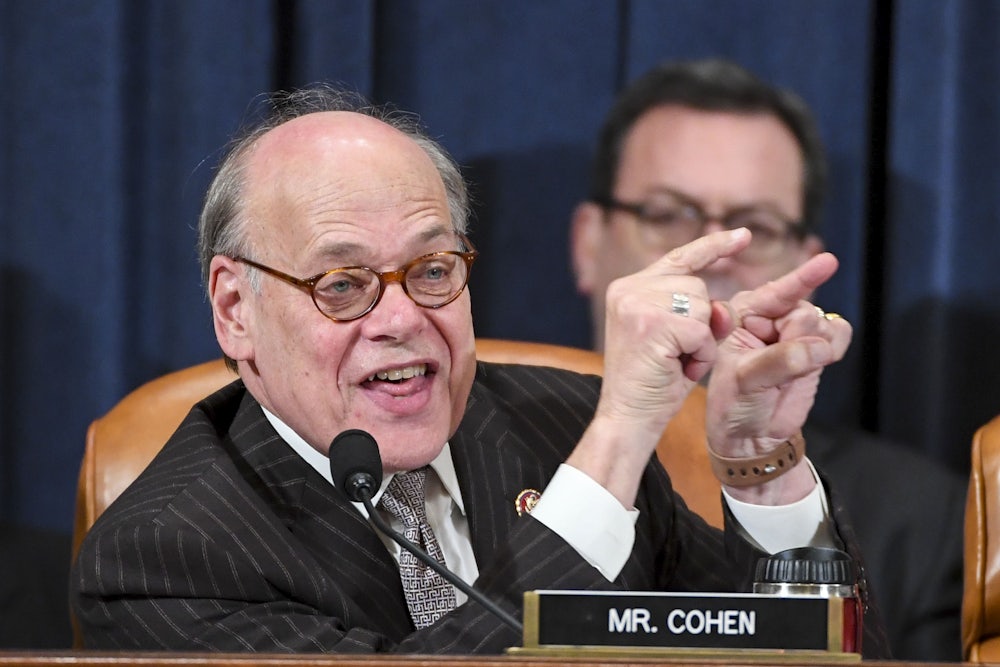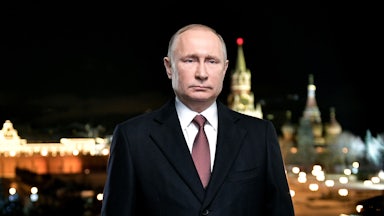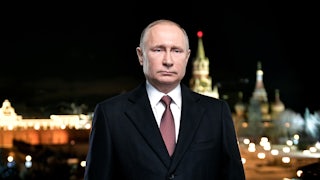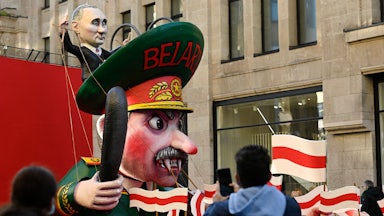Over the past few months, a new range of sanctions have begun rippling across the West, targeting a motley crew of Russian oligarchs, all of whom have profited from their relationship with the Kremlin and pushed Moscow’s interests abroad. But last week, in a little-noticed salvo out of Washington, a new class of scofflaws are suddenly feeling the heat of potential sanctions: the British lawyers who’ve spent years acting as handmaidens to pro-Kremlin billionaires.
In a letter to Secretary of State Antony Blinken, Representative Steve Cohen called for the United States finally to “hold to account those enablers” behind the “unscrupulous work” benefiting oligarchs. Specifically, the Tennessee Democrat singled out the British barristers who’ve spent years helping Russian oligarchs smother the journalists poking into their illicit wealth—and helping turn the United Kingdom into the go-to jurisdiction in which to file frivolous lawsuits against anyone looking into their financing.
The U.K.’s well-earned reputation as a center of “libel tourism” is hardly a new one. It’s based primarily on wide-open libel laws that allow oligarchs to file as many “vexatious lawsuits” (also called “strategic lawsuits against public participation,” or “SLAPP” suits) as they’d like. But Cohen is suddenly the highest-profile American to call out Britain’s legal industry for its role enabling Russian oligarchs—and to highlight directly how British lawyers have become U.S. national security threats. “Among the worst such enablers have been certain lawyers in the United Kingdom,” Cohen wrote. “Despite our close ties with the United Kingdom, the nature of its libel laws and the vast amount of blood money in its financial system make it an ideal place for oligarchs to abuse the law to harass and intimidate.”
Nor did Cohen stop at calling out the industry as a whole. The congressman specifically pointed to a rogues’ gallery of British lawyers who’ve “enabled malign activities of Russian oligarchs.” Among the lawyers singled out were those helping now-sanctioned Russian oligarchs target investigative journalist Catherine Belton, whose recent book detailed the rise of assorted pro-Kremlin figures. Cohen further identified Keith Schilling of the notorious firm Schillings, specifically for his work defending Jho Low, a Malaysian national and one of the greatest kleptocrats of the past few decades. As a result of their years helping prop up some of the shadiest figures across the globe, Cohen called for these British lawyers specifically to be barred from the U.S. and to make their visa bans public.
The entire letter is, in many ways, unprecedented. In effect, Cohen has called for the U.S. to begin expanding its sanctions regime not just to the oligarchs feasting on illicit wealth but to their bagmen residing as citizens of one of America’s closest allies. (While Cohen’s proposal isn’t technically a formal sanction, the distinctions are largely cosmetic; similar sanctions-by-another-name have already been applied to corrupt oligarchs and crooked politicians elsewhere.) After all, these oligarchs don’t exist in a vacuum. For years, they’ve relied on these gatekeepers to Western financial systems not only to launder their wealth but to keep it safe from any prying eyes that may come calling. And few have been such loyal servants to these oligarchs as British lawyers.
Nor is Cohen alone. Not only did anti-oligarch campaigner Bill Browder echo Cohen’s call, but in the past few months a growing chorus in Washington has raised an alarm about Britain’s legal system. Think-tank reports, congressional hearings, reports of backroom diplomatic pressure: American attention on Britain’s role as the center of illicit Russian wealth is suddenly focused in a way it’s never been before. And given the clear linkages between kleptocratic wealth and national security—as seen most especially in (but hardly limited to) Ukraine—American officials’ newfound interest in draining the U.K. of its pro-oligarch industries is unlikely to dissipate.
There is ample reason to follow Cohen’s lead. Even after two months of devastation in Ukraine—which has focused unparalleled attention on “Londongrad” and the U.K.’s central role as a hub for all the services oligarchs need—British lawmakers have hardly made any progress is tightening the laws that allow these lawyers free rein to stanch and stifle investigations. As of now, potential reforms remain firmly in the planning stages. Even with British legislators saying the right things—and even with improvements elsewhere, such as the expansion of real estate transparency and the strengthening of sanctions—journalists still remain vulnerable to deep-pocketed oligarchs and the advantages their filthy lucre offers them whenever they want to manipulate the British courts the same way they’ve turned myriad other British industries to their own benefit.
Britain is hardly some anomaly in this space. Western nations spent years racing to grab a slice of this oligarchic capital, loosening regulations and tightening protections to attract the kinds of malign wealth Russian oligarchs know well. Even supposedly clean countries like Canada and Australia took part in this transnational race to the bottom. And if anything, it’s the U.S. that currently challenges Britain for the pro-kleptocratic crown. Real estate and luxury goods, private equity and hedge funds, anonymous shell companies and anonymous trusts—the U.S. spent decades providing just as many services as its British counterparts for anyone looking to launder any ill-gotten gains, with no questions asked. American lawyers are, in many ways, no different from their British counterparts.
But even while plenty of reforms are still required in the U.S., it’s increasingly clear that the previous era of America being perfectly open to oligarch wealth may be behind us. Between the White House’s recent anti-corruption strategy document, the formation of the bipartisan Counter-Kleptocracy Caucus, and the looming transparency reforms in arenas such as real estate, the U.S. has made stupendous strides and is demonstrating a fervent devotion to cleaning up its own mess. (Unsurprisingly, Cohen has been another leader in this area: The recently proposed ENABLERS Act, which would place anti-money-laundering requirements on U.S. lawyers, has Cohen as a co-sponsor.)
/ In honor of Earth Day, TNR’s climate coverage is free to registered users until April 29. Start reading now.
With Cohen’s new proposal to effectively sanction the pro-oligarch lawyers holed up in places like London, the U.S. appears increasingly likely to use whatever leverage it can to go after the Western foot soldiers helping oligarchs, regardless of where they may be. As well it should: After all, if the greatest national security crisis in generations isn’t enough to move British legislators finally to tackle the oligarchic henchmen in their own backyard, maybe it’s time for the U.S. to start swinging a far bigger counter-kleptocracy stick—regardless of whom it hits.










